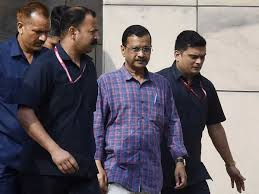
Table of Contents
“Are You Going to Arrest Arvind Kejriwal Again?” High Court to Probe Agency
Introduction
The Delhi High Court recently questioned the Enforcement Directorate (ED) regarding the potential re-arrest of Delhi Chief Minister Arvind Kejriwal. This inquiry came amidst ongoing legal battles involving Kejriwal’s alleged involvement in a liquor policy scam, leading to heightened political drama and public interest.
Background
Arvind Kejriwal, the Chief Minister of Delhi and a prominent leader of the Aam Aadmi Party (AAP), has been embroiled in a legal controversy regarding the Delhi government’s liquor policy. The policy, which was implemented and subsequently scrapped in 2022, has been the subject of investigations by both the Central Bureau of Investigation (CBI) and the ED. Allegations of corruption and irregularities in the policy’s formulation and execution have led to multiple legal challenges and arrests.Arvind Kejriwal
Arrests and Legal Proceedings
Kejriwal was arrested by the CBI on June 26, 2024, in connection with the liquor policy scam. The arrest was contested by Kejriwal’s legal team, which argued that it was an “insurance arrest” aimed at ensuring his continued detention without substantial evidence . Despite these arguments, the Delhi High Court upheld the arrest, stating that there were justifiable reasons for it.
Subsequently, Kejriwal also faced charges in a related money laundering case filed by the ED. While the Supreme Court granted him interim bail in this case on July 12, 2024, the broader legal battle continued .
High Court’s Inquiry
On August 5, 2024, the Delhi High Court posed a direct question to the ED during a hearing: “Are you going to arrest Arvind Kejriwal again?”
The court’s question came after the ED opposed Kejriwal’s bail order, suggesting that the agency might be considering further legal actions against him. The ED’s stance was part of a broader argument that Kejriwal was a central figure, or “sutradhaar,” in the excise scam and that there was substantial evidence to support this claim .
Political and Public Reactions
The ongoing legal saga has significant political implications. The AAP has consistently framed the investigations and arrests as politically motivated actions aimed at discrediting and destabilizing its government in Delhi. Kejriwal’s supporters have echoed these sentiments, arguing that the legal actions are part of a broader campaign against political dissent and reform .Arvind Kejriwal
Opposition parties, on the other hand, have pointed to the seriousness of the allegations and the need for thorough investigations and accountability. They argue that the legal process should be allowed to proceed without political interference or bias.
Opposition parties, on the other hand, have pointed to the seriousness of the allegations and the need for thorough investigations and accountability. They argue that the legal process should be allowed to proceed without political interference or bias.Arvind Kejriwal
Legal and Ethical Considerations
The High Court’s direct questioning of the ED underscores the importance of transparency and fairness in legal proceedings. It raises critical questions about the balance between legal accountability and potential political motivations in high-profile cases. The court’s involvement aims to ensure that legal actions are based on evidence and due process, rather than extrajudicial considerations.Arvind Kejriwal
Conclusion
The Delhi High Court’s recent inquiry into the potential re-arrest of Arvind Kejriwal marks a significant moment in the ongoing legal and political drama surrounding the Delhi liquor policy case. As the case progresses, it will continue to be a focal point of public and political scrutiny, highlighting the challenges and complexities of navigating legal accountability in a highly charged political environment.







